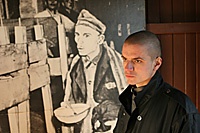Just about the time you’re asking yourself, what could possibly be new about a film on the Holocaust, along comes the latest documentary, KZ, from the award-winning British international human rights film and television documentary producer, Rex Bloomstein.
KZ, short for Konzen-trationslager Mauthausen, features interviews and in-depth conversations with Mauthausen Concentration Camp tour guides and caretakers, as well as several citizens from the town of Mauthausen. Bloomstein also captures reactions from individual tourists and tour groups about the infamous camp located on the hill above the otherwise pastoral and serene hamlet.
Critics have lauded KZ for combining “a grim reality along with the completely absurd.”
Nominated for a grand jury prize at the 2006 Sundance Film festival in the World Cinema: Documentary category, KZ takes moviegoers through the camp, following groups of retirees, students, and tourists from all over the world as they progress through the camp, which is now a pristine tourist destination. Many appear to be quietly surprised by what they are seeing and hearing.
KZ screened as a part of the Seattle Jewish Film Festival.
While the film explores the psychological landscape of Mauthausners today, it also taps the blasé wisdom of unsuspecting tourists — some are disturbed, but others appear inconvenienced by this information.
Mauthausen’s young adults, including young couples starting families, planting flowers, and calculating real estate values, for the most part, seem unbothered by the historical chamber of horrors less than a mile up the road from their quaint homes.
Two hausfraus, reminiscing about their handsome SS-officer husbands at a dining room table, also appear to be unfazed by the interviewer’s suggestion that those same men might have been torturing prisoners there. A third, who had suspicions that there was more going on at the time, will not admit she knew anything more than that. They all shrug it off.
“It wasn’t a burden,” offered another Mauthausen resident.
“Better it secretly ebb away,” said a tourist.
Yet others told what they knew and what they saw. Another older woman who lived in the town during the height of the killing toward the end of the war said she routinely saw piles of bodies awaiting burial. She could not linger long, though, because German soldiers would shoo her way.
“He was a wonderful person,” said a former neighbor of a local SS officer who lived in the town, “but you wouldn’t believe what he did in the camp.”
And it’s hard to say why a young man’s girlfriend made him straighten his shirt and unfold the crumpled cuff of his pant-leg before she took his picture as he stood beside the now-cold and clean ovens that were once used to cremate over 100,000 dead bodies.
It is understandable that visitors to the camp have a kind of souvenir mentality. Hungry travelers can buy a Big Mac at the golden arches before entering the compound or stop off for a beer at the Frellerhoff, the same local pub where camp officers would meet and dine after work during the war.
Nonetheless, amidst the growing concern among Jews that the camps have become cruel monuments dedicated to the tourism industry and indifferent to the suffering of millions, others who walked through it were moved by the things they saw.
“They shot them here and burned them here,” one young man told his girlfriend. “This is insane!”
However, it is the giggly and hormonal high school group offloading from their tour bus, divided by social cliques and dress codes, that come to immediate and silent attention when their guide, the brooding, sullen-eyed and gaunt son of an SS officer, meets them at the camp’s point of entry.
“Here starts your transformation from a human into a creature,” he tells them, addressing them as if they were the prisoners, in a German accent so strong and so deliberate, that his stern stare framed by his closely shaved head gave him an eerie likeness to a camp prisoner. One of the students, a young girl, nearly faints.
The disconnected feelings expressed by some in the film are contrasted by the immense dedication shown by those who operate the facility on a daily basis.
After devoting many long hours of intense emotional energy articulating the drama of the Holocaust to legions of people that pass through the camp each week, the caretaker admits that he is an alcoholic who is plagued by deep depression.
No matter how hard he tries to detach from the job, he says, when he returns home from work each day, he simply cannot. For him, every conversation always leads back to the Holocaust and the camp. His family life is a mess and he is psychologically drained.
Since he began his career in 1970, Bloomstein’s focus has often been on exploring the Holocaust and international human rights abuses. KZ is his first theatrical feature film.
In The Longest Hatred, which he produced in 1993, he mapped out the history of anti-Semitism. The three-part series was broadcast in 20 countries.
Other works include Human Rights, Human Wrongs; Urgent Action; Roots of Evil; Understanding the Holocaust; Liberation; Traitors to Hitler; and Auschwitz And the Allies.
The 12th London Jewish Film Festival honored Bloomstein in 1997 by showing his films for one day, all day, during the festival.
Tucking away the memories
